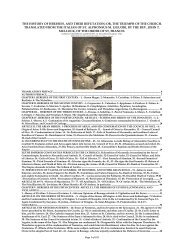The Writings of St. Francis of Assisi - + Saints' Works
The Writings of St. Francis of Assisi - + Saints' Works
The Writings of St. Francis of Assisi - + Saints' Works
Create successful ePaper yourself
Turn your PDF publications into a flip-book with our unique Google optimized e-Paper software.
THE WRITINGS OF ST. FRANCIS OF ASSISI<br />
Virgin Mary, <strong>of</strong> whose womb He 113 received the true flesh <strong>of</strong> humanity and <strong>of</strong> our fragility. ·<br />
Who, "although He was rich" (2 Cor 8:9) above all things, He willed in the world with the Most<br />
Blessed Virgin, His Mother, to chose poverty. · And near His passion He celebrated the Passover<br />
with His disciples and taking bread gave thanks and blest it and broke it saying: "Take and eat,<br />
this is My Body." (Mt 26:26) · "And taking the chalice" He said: "This is My Blood <strong>of</strong> the New<br />
Testament, which" on your behalf 114 and "on behalf <strong>of</strong> the many will be poured out in remission<br />
<strong>of</strong> sins." (Mt 26:27) · <strong>The</strong>n He prayed to the Father saying: "Father, if it can be done, let this<br />
chalice pass from Me." 115 · "And His sweat became as drops <strong>of</strong> blood flowing down upon the<br />
earth" (Lk 22:44). · Nevertheless, He placed His own will in the Will <strong>of</strong> the Father, saying:<br />
"Father, Thy Will be done" (Mt 26:42); "not as I will, but as Thou" (Mt 26:39). · Of whose<br />
Father such was the Will, that His Son, blest and glorious, whom He gave to us and who had<br />
been born on our behalf, <strong>of</strong>fer His very self through His very own Blood as a Sacrifice and<br />
Victim upon the altar <strong>of</strong> the Cross, · not for His own sake, through whom all things were made<br />
(cf. Jn 1:3), but on behalf <strong>of</strong> our sins, · leaving us an example, so that we may follow His<br />
footsteps (cf. 1 Pet 2:21). · And He wants 116 all to be saved through Him and that we receive Him<br />
with a pure heart and our own chaste body. · But there are few, who want to receive Him and be<br />
saved through Him, though His "yoke is sweet" and His "burden light" (cf. Mt 11:30).<br />
Those who do not want to taste how "sweet the Lord" is (cf. Ps 33:9) and (who) love<br />
(dilectio) "shadows more than the Light" (Jn 3:19) not wanting to fulfill the mandates <strong>of</strong> God,<br />
have been cursed; · <strong>of</strong> whom it is said through the prophet: "Cursed are they who turn away from<br />
Thy mandates." (Ps 118:21). · But, oh how blessed and blest are those who love God and do as<br />
the Lord Himself says in the Gospel: "Love the Lord thy God with thy whole heart" and "with<br />
thy whole mind" and "thy neighbor as thy very self" (Mt 22:37,39).<br />
Let us therefore love God and adore Him with a pure heart and a pure mind, since He<br />
Himself, seeking (such) above all, has said: "True adorers will adore the Father in spirit and in<br />
truth." (Jn 4:23) · For "it is proper" that all, "who adore Him, adore" Him "in the spirit" <strong>of</strong> truth<br />
(cf. Jn 4:24). · And let us <strong>of</strong>fer 117 Him praises and prayers "day and night" (Ps 31:4) by saying:<br />
"Our Father who art in Heaven" (Mt 6:9), since "it is proper that" we "always pray and not fail to<br />
do what we might" (Lk 18:1).<br />
Since we ought to confess all our sins to a priest; let us also receive the Body and Blood<br />
<strong>of</strong> Our Lord Jesus Christ from him. · He who does not eat His Flesh and does not drink His<br />
Blood (cf. Jn 6:55.57), "cannot enter into the Kingdom <strong>of</strong> God" (Jn 3:5). · Nevertheless let him<br />
eat and drink worthily, because he who receives "unworthily eats and drinks judgement for<br />
himself, not dejudicating the Body <strong>of</strong> the Lord" (1 Cor 11:29), that is, he does not discern it. · In<br />
addition let us produce "fruits worthy <strong>of</strong> penance" (Lk 3:8). · And let us love (our) neighbors as<br />
our very selves (cf. Mt 22:39). · And if one does not want to love (amor) them as his very self, at<br />
least he does not bring evils upon them, but does good (to them).<br />
113 i.e. the Son <strong>of</strong> God. <strong>The</strong> Latin here is ex cuius utero . . . recepit . . .: God assumed the true<br />
flesh <strong>of</strong> humanity by taking a share <strong>of</strong> the Virgin's humanity, which She <strong>of</strong>fered to Him from Her<br />
womb. This phrase recalls that <strong>of</strong> the Nicene Creed, "who was conceived by the Holy Ghost <strong>of</strong><br />
the Virgin Mary...". For scriptural parallels, cf. Ps 21:10; 70:6; Is 44:24; 49:5; Lk 1:15.<br />
114 This recalls the Roman Canon: qui pro vobis et pro multis.<br />
115 cf. Breviarum Romanum (1961): Responsorum I ad Matut. Feriae V hebdomadae sanctae.<br />
116 <strong>St</strong>. <strong>Francis</strong> refers to what God wants <strong>of</strong> man, in creating man with a free will; however, man is<br />
thus free to accept this will <strong>of</strong> God or reject it, by sin.<br />
117 lit. "speak to."<br />
Page - 41













